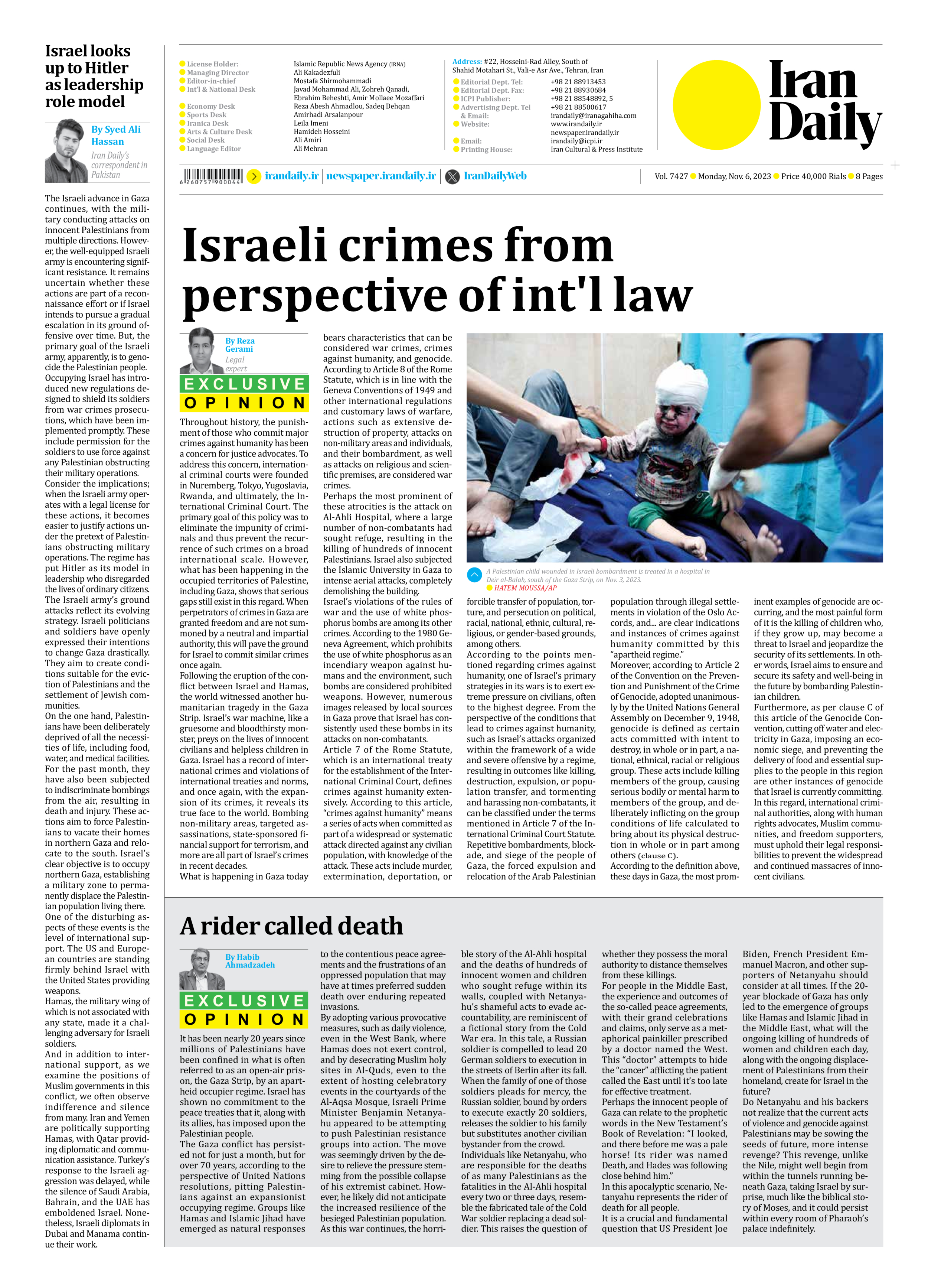
A rider called death
By Habib Ahmadzadeh
It has been nearly 20 years since millions of Palestinians have been confined in what is often referred to as an open-air prison, the Gaza Strip, by an apartheid occupier regime. Israel has shown no commitment to the peace treaties that it, along with its allies, has imposed upon the Palestinian people.
The Gaza conflict has persisted not for just a month, but for over 70 years, according to the perspective of United Nations resolutions, pitting Palestinians against an expansionist occupying regime. Groups like Hamas and Islamic Jihad have emerged as natural responses to the contentious peace agreements and the frustrations of an oppressed population that may have at times preferred sudden death over enduring repeated invasions.
By adopting various provocative measures, such as daily violence, even in the West Bank, where Hamas does not exert control, and by desecrating Muslim holy sites in Al-Quds, even to the extent of hosting celebratory events in the courtyards of the Al-Aqsa Mosque, Israeli Prime Minister Benjamin Netanyahu appeared to be attempting to push Palestinian resistance groups into action. The move was seemingly driven by the desire to relieve the pressure stemming from the possible collapse of his extremist cabinet. However, he likely did not anticipate the increased resilience of the besieged Palestinian population.
As this war continues, the horrible story of the Al-Ahli hospital and the deaths of hundreds of innocent women and children who sought refuge within its walls, coupled with Netanyahu’s shameful acts to evade accountability, are reminiscent of a fictional story from the Cold War era. In this tale, a Russian soldier is compelled to lead 20 German soldiers to execution in the streets of Berlin after its fall. When the family of one of those soldiers pleads for mercy, the Russian soldier, bound by orders to execute exactly 20 soldiers, releases the soldier to his family but substitutes another civilian bystander from the crowd.
Individuals like Netanyahu, who are responsible for the deaths of as many Palestinians as the fatalities in the Al-Ahli hospital every two or three days, resemble the fabricated tale of the Cold War soldier replacing a dead soldier. This raises the question of whether they possess the moral authority to distance themselves from these killings.
For people in the Middle East, the experience and outcomes of the so-called peace agreements, with their grand celebrations and claims, only serve as a metaphorical painkiller prescribed by a doctor named the West. This “doctor” attempts to hide the “cancer” afflicting the patient called the East until it’s too late for effective treatment.
Perhaps the innocent people of Gaza can relate to the prophetic words in the New Testament’s Book of Revelation: “I looked, and there before me was a pale horse! Its rider was named Death, and Hades was following close behind him.”
In this apocalyptic scenario, Netanyahu represents the rider of death for all people.
It is a crucial and fundamental question that US President Joe Biden, French President Emmanuel Macron, and other supporters of Netanyahu should consider at all times. If the 20-year blockade of Gaza has only led to the emergence of groups like Hamas and Islamic Jihad in the Middle East, what will the ongoing killing of hundreds of women and children each day, along with the ongoing displacement of Palestinians from their homeland, create for Israel in the future?
Do Netanyahu and his backers not realize that the current acts of violence and genocide against Palestinians may be sowing the seeds of future, more intense revenge? This revenge, unlike the Nile, might well begin from within the tunnels running beneath Gaza, taking Israel by surprise, much like the biblical story of Moses, and it could persist within every room of Pharaoh’s palace indefinitely.







